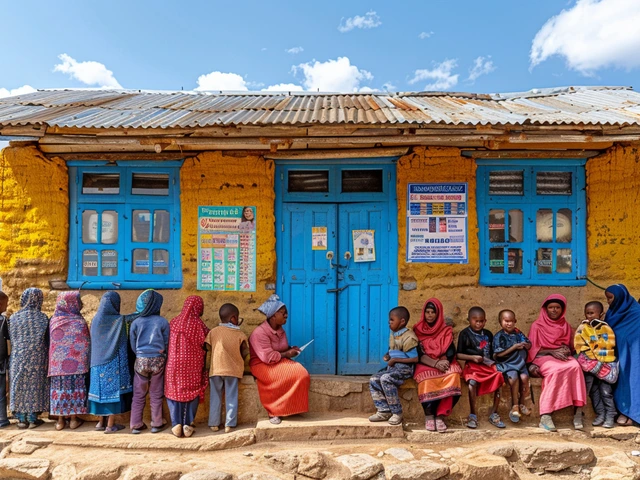Unveiling the Warmth of Ethiopian Hospitality
Ethiopia, with its diverse tapestry of cultures, landscapes, and history, often invites curiosity about the disposition of its people. Is the warmth as endless as its ancient tales? Having journeyed through dusty roads, ascended its highlands, and walked the bustling streets of Addis Ababa, I've been embraced by smiles that felt like sunrise on the Simien Mountains. Ethiopia's welcoming nature isn’t just an act of courtesy but a deeply ingrained part of their identity shaped by strong communal values and a rich tapestry of cultural and religious practices.
First off, understanding the essence of Ethiopian hospitality means understanding 'Gursha'—a tradition where people feed each other with their hands as a sign of friendship and love. This gesture, often seen in communal eating scenarios, symbolizes the deep-rooted belief in unity and togetherness. Through meals shared under thatched roofs or in the modern kitchens of Addis, I have felt the unspoken bond that food weaves amongst Ethiopians—it's a language of care and inclusion.
The Cultural and Religious Pillars of Ethiopian Friendliness
In exploring the roots of Ethiopian friendliness, one quickly notices the significant impact of religious and cultural practices. Ethiopia is a land where Christianity and Islam coexist harmoniously, with religious festivals often becoming a melting pot for communal joy irrespective of faith. The Ethiopian Orthodox Church, in particular, with its ancient rituals and deeply spiritual observances, fosters a sense of unity and goodwill amongst its followers.
Timkat, the Epiphany celebration in Ethiopia, is a perfect example where the spirit of togetherness transcends all. Through the streets, people dance, sing, and embrace in a collective act of faith and happiness. Such occasions underscore the Ethiopian ethos of unity and shared joy. Beyond religious observances, the Ethiopian way of life, influenced by the many ethnic groups and their traditions, encourages a communal living that inherently promotes friendliness and openness.
Travel Tips for Embracing Ethiopian Culture and Making Friends
As enchanting as it is to witness, integrating oneself into this culture requires respect, openness, and an eagerness to learn. When travelling through Ethiopia, a few simple gestures can pave the way for a deeper connection with its people. Learning basic phrases in Amharic, like 'Salam' (Hello) or 'Ameseginalehu' (Thank you), not only breaks the ice but also shows appreciation for their culture. Respectfulness towards cultural and religious practices is paramount; for instance, removing shoes before entering someone’s home or a place of worship is a sign of respect.
Moreover, spending time to understand the context of local traditions and participating in community activities can enrich your travel experience. Ethiopians are proud of their heritage, and showing genuine interest can turn a simple interaction into a doorway to friendships and memorable experiences. Whether it’s through sharing coffee in a traditional 'Buna' ceremony or joining a local holiday celebration, the opportunities to connect and share are boundless.
Navigating Misconceptions and the Reality of Ethiopian Friendliness
While my narratives paint a picture of an overtly friendly Ethiopia, it’s essential to address the skepticism that often clouds such perceptions. Some might wonder, is this friendliness genuine or merely a facade? From my experiences, the warmth I’ve encountered has felt as authentic as the Ethiopian coffee. However, like any society, there will always be variances. Understanding that friendliness does not equate to uniformity helps in appreciating the genuine connections you make.
It’s also crucial to adopt responsible travel practices. Being mindful of one’s actions and their impacts on local communities can foster mutual respect and understanding. Navigating cultural differences with sensitivity ensures that the friendliness of Ethiopians is met with equal warmth and open-heartedness from travellers.
In conclusion, the soul of Ethiopia is mirrored in the smiles of its people, the communal meals, and the unspoken bond that ties every interaction. Their friendliness isn’t just a tourist attraction but a testament to a culture that values connection, community, and genuine human interactions. So, to the question, 'Are people in Ethiopia friendly?'—the land of origins smiles back a resounding yes.

 Veterinarian Salary Insights in Ethiopia
Veterinarian Salary Insights in Ethiopia
 Pharmacist Salary Insights in Ethiopia: 2024 Guide
Pharmacist Salary Insights in Ethiopia: 2024 Guide
 Profitable Business Opportunities in Ethiopia
Profitable Business Opportunities in Ethiopia
 What is the Average Salary of a Nurse in Ethiopia? Exploring Nursing Wages and Benefits
What is the Average Salary of a Nurse in Ethiopia? Exploring Nursing Wages and Benefits
 Understanding the Major Health Concerns in Ethiopia
Understanding the Major Health Concerns in Ethiopia
Larry Keaton
April 4, 2024 AT 00:55Yo, I’m tellin y’all that Ethiopian hospitality is like a giant hug – it hits ya hard and you can’t shake it off. The gursha thing? That’s straight up love on a plate, no joke. If you’re thinkin you can just pass thru without sayin “selam”, you’re missin the whole vibe.
Liliana Carranza
April 12, 2024 AT 15:02Wow, reading about gursha makes my heart do a little dance! The way you describe the communal meals feels like a warm blanket of colors and flavors wrapping around you.
Jeff Byrd
April 21, 2024 AT 05:09Ah, the classic “Ethiopian friendliness” narrative – as if every street corner is a welcome mat. Sure, the smiles are real, but let’s not pretend it’s a perpetual party. If you go expecting nonstop celebration, you might get a bit sore. Still, the genuine moments shine through.
Joel Watson
April 29, 2024 AT 19:16The author’s depiction of Ethiopian conviviality is both evocative and analytically sound. The existence of gursha, as a semiotic act of reciprocity, reflects a deep-rooted ethos of communal solidarity. Historically, such practices have been reinforced by the syncretic religious landscape that permeates the highlands and lowlands alike. The interfaith coexistence between Orthodox Christianity and Islam furnishes a fertile ground for shared ceremonial experiences. Timkat, for instance, operates not merely as a religious rite but as a societal catalyst for collective effervescence. Moreover, the linguistic exchange, exemplified by simple salutations such as “selam,” functions as a pragmatic bridge across ethnic demarcations. The author's emphasis on the tactile nature of feeding-gursha-constitutes a powerful illustration of embodied hospitality. While the narrative celebrates these virtues, it must also acknowledge the heterogeneity inherent within any nation‑state. Regional variations, socioeconomic disparities, and urban‑rural divides inevitably modulate interpersonal warmth. Nevertheless, the overarching cultural paradigm remains oriented toward inclusivity and generosity. The author's experiential anecdotes, ranging from bustling Addis avenues to rustic highland villages, provide empirical grounding for the claims made. Such qualitative evidence, though anecdotal, aligns with anthropological literature on East African social structures. The recommendation to learn Amharic phrases is prudent, as linguistic competence often correlates with perceived authenticity. In sum, the synthesis of historical, religious, and culinary elements offers a comprehensive portrait of Ethiopian friendliness. The article thus succeeds in conveying that the warmth experienced is neither superficial nor monolithic, but rather a nuanced tapestry woven through centuries of shared humanity.
Chirag P
May 8, 2024 AT 09:23Your respectful tone really captures the balance between curiosity and humility. Approaching Ethiopian culture with assertive openness, as you suggest, can bridge gaps effectively. The reminder about removing shoes is spot‑on.
RUBEN INGA NUÑEZ
May 16, 2024 AT 23:30While your enthusiasm is noted, a more precise description would enhance credibility. The phrase “hits ya hard” could be replaced with “leaves a lasting impression”. Additionally, remember to capitalize proper nouns such as “Ethiopia”.
Michelle Warren
May 25, 2024 AT 13:37meh i read this and i think its overrated lol its not that big a deal but kinda cool i guess
Christopher Boles
June 3, 2024 AT 03:44Great point! Even if the vibe isn’t a nonstop party, the genuine moments you mentioned are what make travel memorable. A simple “selam” really does open doors.
Crystal Novotny
June 11, 2024 AT 17:52Life is a tapestry woven from threads of culture; each stitch tells a story, and Ethiopia’s thread shines bright.
Reagan Traphagen
June 20, 2024 AT 07:59Don’t be fooled by the glossy travel blogs – there’s an agenda to paint Ethiopia as a utopia. Behind the smiles lies a systematic effort to hide political strife and suppress dissent. Stay vigilant, question the narrative.
mark sweeney
June 28, 2024 AT 22:06Sure, every place has its shadows, but painting the whole country as a conspiracy just because of a few headlines is a stretch. While it’s wise to stay critical, the hospitality described by travelers isn’t a fabricated myth.
randy mcgrath
July 7, 2024 AT 12:13Thinking about cultural exchange reminds me that genuine curiosity can foster deeper connections.
Frankie Mobley
July 16, 2024 AT 02:20If you want a quick tip, sharing a cup of buna with locals is an instant conversation starter. It’s simple, authentic, and everyone appreciates the gesture.
ashli john
July 24, 2024 AT 16:27Love that suggestion! It’s amazing how a coffee ritual can break the ice and make everyone feel included
Kim Chase
August 2, 2024 AT 06:34i totally agree its all about respect and tryin new things
David Werner
August 10, 2024 AT 20:41Exactly, but beware that some “new things” are covert attempts to embed foreign influence. The cultural exchange often masks deeper geopolitical maneuvers. Stay alert!
Paul KEIL
August 19, 2024 AT 10:48The discourse surrounding Ethiopian social norms necessitates a lexicon replete with sociocultural parametrics; leveraging such terminology facilitates epistemic alignment across interdisciplinary frameworks.
Horace Wormely
August 28, 2024 AT 00:55Note: “Ethiopia” should be capitalized.